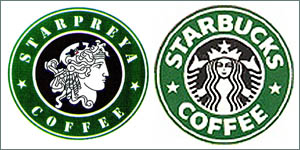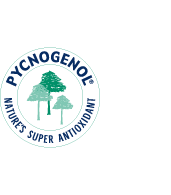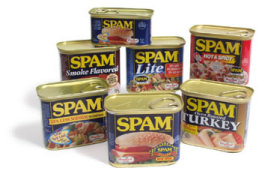It's Final: Starbucks Loses South Korean STARPREYA Infringement Dispute
Starbucks Corp. has lost the final round of its infringement dispute with Korean coffee retailer Elpreya Co. The Supreme Court of Korea today affirmed the dismissal of Starbucks’ petition to cancel Elpreya’s STARPREYA word and design marks on confusion grounds.
 “The trademarks of Starbucks and Elpreya are different in appearance and name,” the court found. “We also cannot judge that the Starbucks trademark was well-known at home before Elpreya released its registered trademark to the market.”
“The trademarks of Starbucks and Elpreya are different in appearance and name,” the court found. “We also cannot judge that the Starbucks trademark was well-known at home before Elpreya released its registered trademark to the market.”
Justice was swift. Starbucks appealed the adverse decision it received from the Patent Court of Korea only weeks ago.
Early news service reports on today’s decision are available here, here, and here.
In December, Seattle Trademark Lawyer discussed the case here and here.
Ninth Circuit Affirms Dilution Finding in PYCNOGENOL Case
The Ninth Circuit yesterday published a new dilution case, affirming the Central District of California’s finding of dilution in Horphag Research Ltd. v. Garcia, 2007 WL 45910. The claim turned on defendant Larry Garcia’s use of plaintiff Horphag’s trademark PYCNOGENOL on Mr. Garcia’s Web site, HealthierLife.com.
The Ninth Circuit found that Mr. Garcia’s using PYCNOGENOL as a generic term, selling a product he claimed was the “true Pycnogenol,” and altering quotations from scientific literature discussing  PYCNOGENOL to make them appear as though they were discussing Mr. Garcia’s competing product blurred Horphag’s famous mark. The court found Horphag met the Moseley v. V. Secret actual dilution standard by offering testimony that consumers who contacted Horphag learned — after purchasing Mr. Garcia’s product — that the product they had purchased was not Horphag’s PYCNOGENOL product.
PYCNOGENOL to make them appear as though they were discussing Mr. Garcia’s competing product blurred Horphag’s famous mark. The court found Horphag met the Moseley v. V. Secret actual dilution standard by offering testimony that consumers who contacted Horphag learned — after purchasing Mr. Garcia’s product — that the product they had purchased was not Horphag’s PYCNOGENOL product.
According to the court, PYCNOGENOL is a chemical antioxidant that “supposedly assists in nutritional distribution and proper circulation” and is one of the “fifteen most sold” herbal supplements in the United States.
Cisco Sues Apple Over IPHONE
You heard it here first (possibly): Cisco Systems, Inc., sues Apple Inc. for infringing the trademark IPHONE. Cisco’s complaint, filed two hours ago in the Northern District of California, is available here.
Two More Thoughts on BOWFLEX Dilution Case
On December 27, Seattle Trademark Reporter reported on the Western District’s summary judgment dismissal of Nautilus Group’s dilution claims against Icon Health & Fitness in the BOWFLEX-CROSSBOW case here. The decision turned in part on Judge Ricardo Martinez’s finding that Icon’s use of BOWFLEX through the purchase of search engine keywords constituted permissible comparative advertising.
Professors Rebecca Tushnet and Eric Goldman recently discussed the case in their respective blogs here and here.
Prof. Tushnet wondered why the court applied the “actual dilution” standard when the case was pending after the Trademark Dilution Revision Act had overruled Moseley v. V. Secret and reinstated the “likelihood of dilution” standard, a question that had crossed my mind as well.
On the keyword issue, Prof. Goldman observed:
“We haven’t seen too many dilution challenges against purchasing keywords. This case might suggest that such dilution claims [will] not be favorably received. Then again, given this case applied pre-TDRA law, a post-TDRA court could be more receptive. As usual, though, the exact words in the ad copy appear to make a difference.”
Spam Arrest Spends $500k in TTAB Fight with Hormel Over SPAM Trademark
Seattle-based Spam Arrest LLC sent out a press release today publicizing its dispute with Hormel Foods Corp. over Spam Arrest’s registration of SPAM ARREST in connection with “software designed to eliminate unsolicited commercial electronic mail.” Hormel seeks to cancel Spam Arrest’s registration in a case now pending with the Trademark Trial and Appeal Board. The TTAB will hear oral argument on February 23.

Spam Arrest claims it is the only company besides Hormel to obtain a federal registration for a mark containing the word SPAM. That’s true, though there are 33 applications for registration pending.
Spam Arrest states that it has spent almost $500k in the dispute.
Isn’t “spam” generic for unwanted commercial email? Spam Arrest thinks so — it disclaimed any trademark rights in that term. Obviously, Hormel begs to differ.
The TTAB’s last decision in the case — its March 30, 2005, order denying Spam Arrest’s motion for summary judgment — is available here.